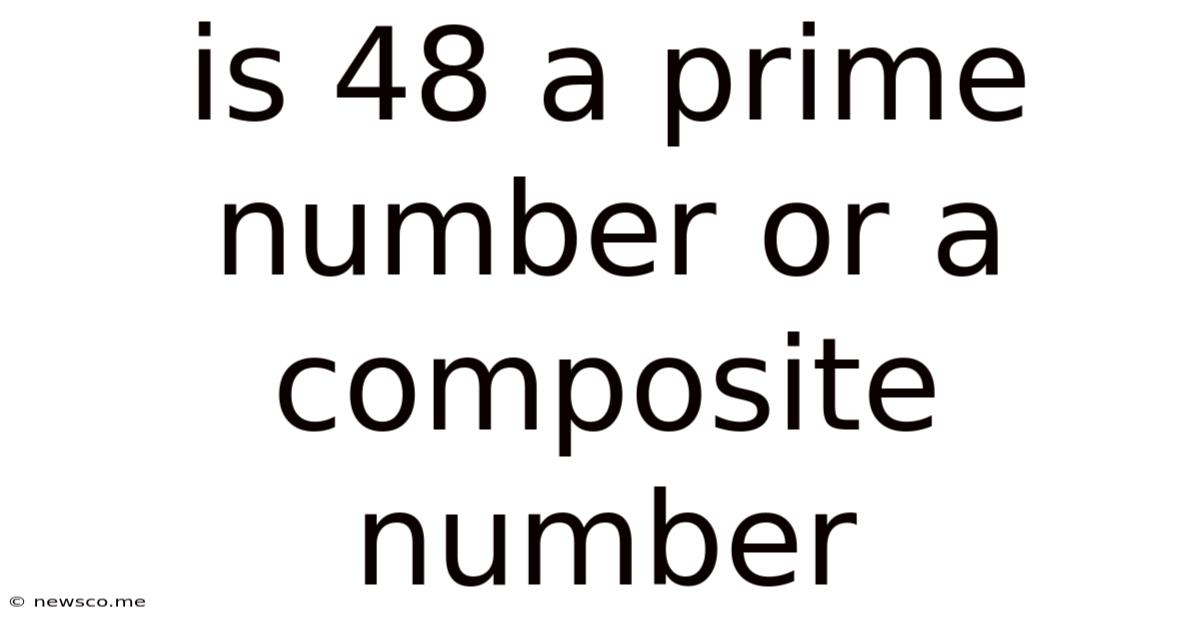Is 48 A Prime Number Or A Composite Number
News Co
Apr 03, 2025 · 5 min read

Table of Contents
Is 48 a Prime Number or a Composite Number? A Deep Dive into Number Theory
Determining whether a number is prime or composite is a fundamental concept in number theory. This article will delve into the properties of prime and composite numbers, explain why 48 is definitively a composite number, and explore related concepts to enhance your understanding of this mathematical cornerstone.
Understanding Prime and Composite Numbers
Before we classify 48, let's establish a clear understanding of the definitions:
Prime Number: A prime number is a natural number greater than 1 that has no positive divisors other than 1 and itself. This means it's only divisible by 1 and the number itself without leaving a remainder. Examples include 2, 3, 5, 7, 11, and so on. The number 1 is considered neither prime nor composite.
Composite Number: A composite number is a positive integer that has at least one divisor other than 1 and itself. In simpler terms, it can be factored into smaller positive integers. Examples include 4 (2 x 2), 6 (2 x 3), 9 (3 x 3), and many more.
Why 48 is a Composite Number
The determination of whether 48 is prime or composite is straightforward. To be a prime number, 48 would need to be divisible only by 1 and itself. However, 48 has numerous divisors besides 1 and 48.
Let's explore some of its factors:
- 2: 48 divided by 2 equals 24.
- 3: 48 divided by 3 equals 16.
- 4: 48 divided by 4 equals 12.
- 6: 48 divided by 6 equals 8.
- 8: 48 divided by 8 equals 6.
- 12: 48 divided by 12 equals 4.
- 16: 48 divided by 16 equals 3.
- 24: 48 divided by 24 equals 2.
The existence of these divisors definitively proves that 48 is a composite number. It can be factored into several pairs of smaller integers, demonstrating that it's not a prime number.
Prime Factorization of 48
A crucial concept related to composite numbers is prime factorization. This involves expressing a composite number as a product of its prime factors. For 48, the prime factorization is:
2<sup>4</sup> x 3
This means 48 can be written as 2 multiplied by itself four times, then multiplied by 3. This representation is unique to each composite number (Fundamental Theorem of Arithmetic). This factorization helps in various mathematical operations, particularly in simplifying fractions and solving equations.
Exploring Related Number Theory Concepts
Understanding prime and composite numbers opens the door to various fascinating areas within number theory. Let's briefly explore some:
1. Sieve of Eratosthenes
This ancient algorithm is a remarkably efficient method for finding all prime numbers up to any given limit. It works by iteratively marking as composite the multiples of each prime, starting with the smallest prime number, 2. The numbers that remain unmarked are prime.
2. Greatest Common Divisor (GCD) and Least Common Multiple (LCM)
These concepts are fundamental in simplifying fractions and solving problems involving ratios and proportions. The GCD is the largest number that divides two or more integers without leaving a remainder, while the LCM is the smallest number that is a multiple of two or more integers. Understanding prime factorization greatly simplifies the calculation of GCD and LCM.
3. Euclid's Theorem on the Infinitude of Primes
This theorem, a cornerstone of number theory, proves that there are infinitely many prime numbers. It's a profound statement about the nature of prime numbers and highlights their fundamental role in mathematics. Euclid's proof is elegant and relies on a proof by contradiction.
4. Goldbach's Conjecture
This is one of the oldest and most famous unsolved problems in number theory. It states that every even integer greater than 2 can be expressed as the sum of two prime numbers. While extensively tested and believed to be true, a rigorous mathematical proof remains elusive.
Practical Applications of Prime and Composite Numbers
The concepts of prime and composite numbers extend far beyond abstract mathematical theory. They have significant applications in various fields, including:
-
Cryptography: Prime numbers are fundamental to modern cryptography, particularly in public-key cryptography systems like RSA. The security of these systems relies heavily on the difficulty of factoring large composite numbers into their prime factors.
-
Computer Science: Prime numbers are used in hash table algorithms, random number generation, and other computational processes. Efficient prime number testing algorithms are crucial in these applications.
-
Coding Theory: Prime numbers play a critical role in error-correcting codes, which are used to ensure reliable data transmission in communication systems.
-
Digital Signal Processing: Prime numbers are utilized in the design of efficient digital filters and other signal processing algorithms.
Conclusion: 48's Composite Nature and its Significance
In summary, 48 is undeniably a composite number due to its numerous divisors beyond 1 and itself. Its prime factorization, 2<sup>4</sup> x 3, highlights its structure and facilitates various mathematical operations. Understanding the distinction between prime and composite numbers is vital not just in theoretical number theory but also in practical applications across diverse fields. This article serves as an introduction to this fundamental concept and its far-reaching implications. Further exploration of number theory will uncover a deeper appreciation for the elegance and power inherent within these seemingly simple classifications of numbers. The seemingly simple question of whether 48 is prime or composite leads us to a rich tapestry of mathematical concepts, showcasing the interconnectedness and beauty of mathematics.
Latest Posts
Related Post
Thank you for visiting our website which covers about Is 48 A Prime Number Or A Composite Number . We hope the information provided has been useful to you. Feel free to contact us if you have any questions or need further assistance. See you next time and don't miss to bookmark.